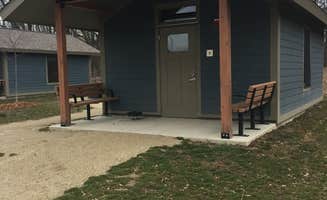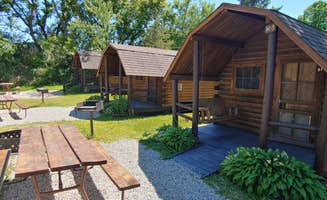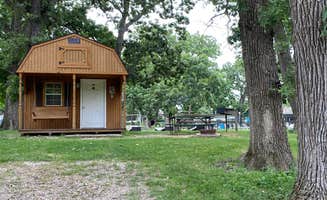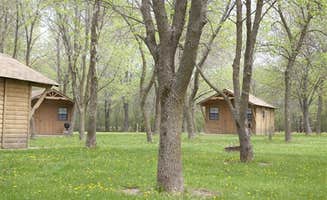Cabin camping near La Grange Park, Illinois offers several options within a one-hour drive. The region features dense deciduous forest preserves across northern Illinois, with elevations typically ranging between 580-700 feet above sea level. Most cabin accommodations remain open year-round, though winter temperatures can drop below freezing from December through February, making heated cabins essential during cold months.
What to do
Trail exploration opportunities: At Camp Bullfrog Lake, visitors can access extensive mountain biking networks directly from campsites. One camper noted, "We've camped here a few times and it is always a great experience... What's great about this location is the access to the miles and miles of MTB and hiking trails just out the front step of your campsite."
Kayaking on small lakes: Camp Bullfrog Lake offers kayak rentals for $15 per hour including life vests. "The kayaks are $15 and hour and include life vests. The lake is pretty small but it was fun to putter around," shared a reviewer who visited during summer.
Rock climbing walls: Camp Sullivan maintains a recreational barn with climbing facilities popular for families. According to a visitor: "There is an activities barn with a rock climbing wall. There are smaller family cabins with heat available to rent as well as large bunkhouses for organized groups."
Wildlife viewing opportunities: Forest preserves surrounding cabin locations support diverse wildlife. One Bullfrog Lake camper reported, "We hiked 10 miles and saw tons of animals and birds including a snake, loads of herons and songbirds, deer, a raccoon and a Cooper's Hawk."
What campers like
Off-season solitude: Winter cabin stays offer quiet experiences with fewer crowds. According to a Camp Reinberg visitor, "It cleared out Sunday and we nearly had the whole loop to ourselves during the week."
Accessible accommodations: Camp Reinberg cabins feature well-designed accessibility features. "The campground provides easy access to hiking and bike trails directly in the park and they go for miles and miles. This was a highlight for me, along with the butterflies and fireflies that put on a beautiful show," noted one camper.
Proximity to urban amenities: Most cabin locations maintain a balance between nature immersion and access to services. A Camp Reinberg visitor mentioned, "It's a short trip to get groceries or whatever you need in Palatine, but there's also a little camp store."
Secure campgrounds: Cabin campers appreciate safety measures. "I was visiting family in the city and surrounding suburbs and felt secure staying here as well as leaving my RV in this campground. There is a gate that is closed at 10pm every night and opened again in the morning," reported one camper at Camp Reinberg.
What you should know
Seasonal differences in amenities: Facilities vary throughout the year. A Honeysuckle Hollow visitor noted, "We stayed on a primitive/wilderness site for $12 with no electric. They will allow anyone on these sites-we even saw huge RV's and 5th wheels on primitive sites."
Wildlife encounters: Prepare for insects and wildlife encounters, especially during warmer months. One camper at Honeysuckle Hollow warned, "SO many ticks. With a baby crawling that needed to be set free, we were constantly doing checks...Also - the raccoons at night here are no joke. The second it's dusky, they come scavenging for absolutely anything food has touched."
Varied shower conditions: Shower facilities differ significantly between campgrounds. A visitor to Camp Sullivan reported, "The water pressure in the showers was so-so, but there was no hot water."
Limited cell service: Connectivity varies by location and carrier. One camper mentioned, "I barely have T-Mobile service (not the camps fault but thought I'd share)."
Tips for camping with families
Screened shelters recommended: For cabin alternatives, consider bringing screened enclosures. A Potowatomi Campground visitor advised, "Our site was perfect with trees to hang a hammock on and for the kids to run around... Luckily our screen house pop up on a tarp that was sprayed ahead for tick repellent plus a blanket on top of that did the trick."
Visit nature centers: Many locations offer educational opportunities for children. At Potowatomi Campground, a parent shared, "We did have a really awesome time at the main office/nature center, where my kiddos got to feed and hold a variety of reptiles!"
Choose sites strategically: Select cabin or tent sites based on proximity to facilities. A Honeysuckle Hollow visitor recommended, "We chose the loop 11 was on because it was close to the path to the playgrounds and lakes plus bathrooms... avoid the first 2 sites from either end as the ones closest to the main loop aren't very deep. Closer to the center of this row is best."
Weekday visits preferred: For quieter family experiences, schedule mid-week stays when possible. A Camp Reinberg guest noted, "The campground was really busy during the weekend, but cleared out Sunday and we nearly had the whole loop to ourselves during the week."
Tips from RVers
Distance to electrical outlets: At Chicago Northwest KOA, site layout impacts accessibility. "The RV sites are a little close together but they have it set up where your RVs doors open on opposite sides so it gives a little privacy," explained one visitor.
Water access challenges: Some campgrounds require special arrangements for water. A Camp Reinberg RVer shared, "The staff has to hook up a very very long hose and will bring it to your site. You can get water, it's just an inconvenience for you and them. But they do it with a good attitude."
Dump station timing: Plan accordingly for sanitation needs. One camper advised, "The dump station was near the entrance to the camping loop and had potable water. It was also very busy and we had to wait when filling up and again when dumping."





